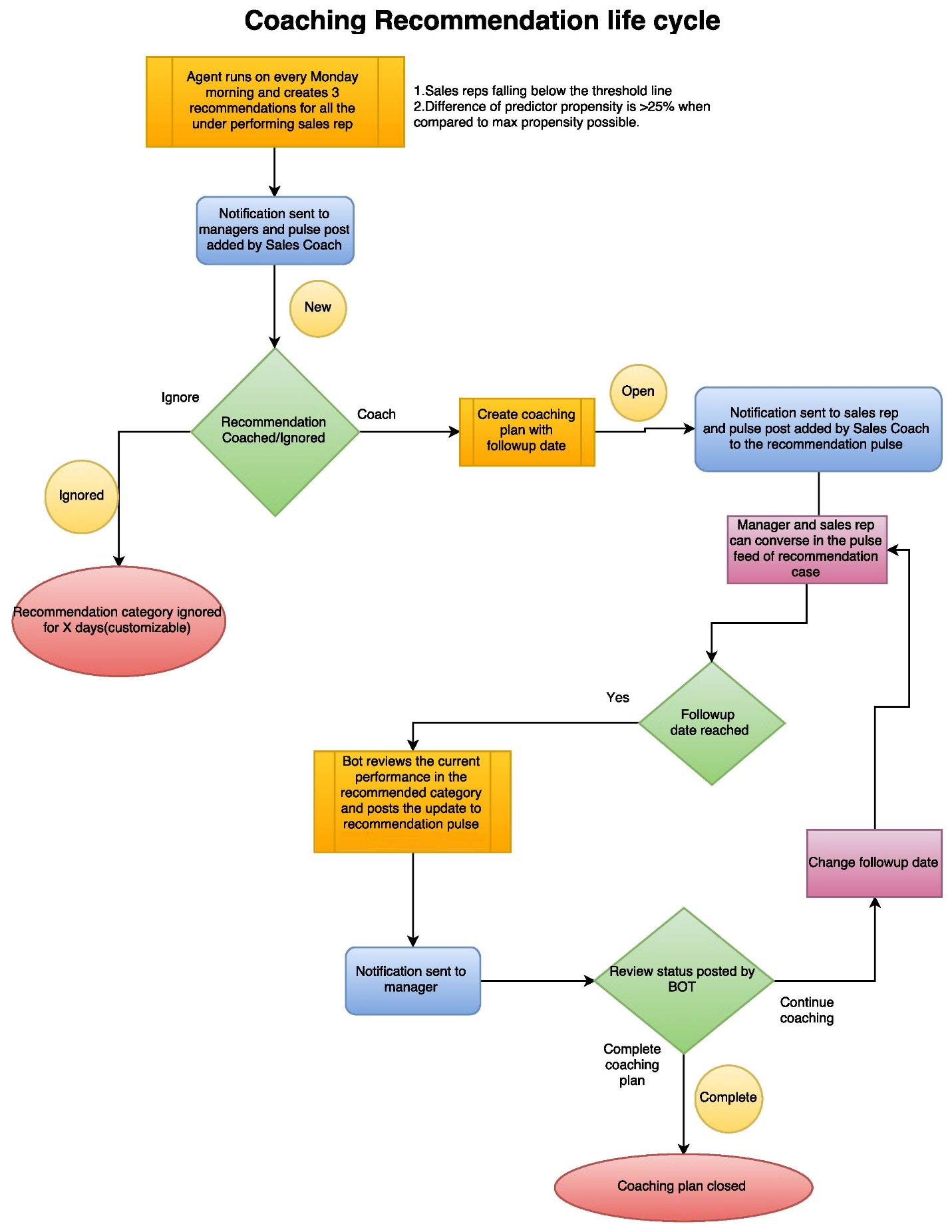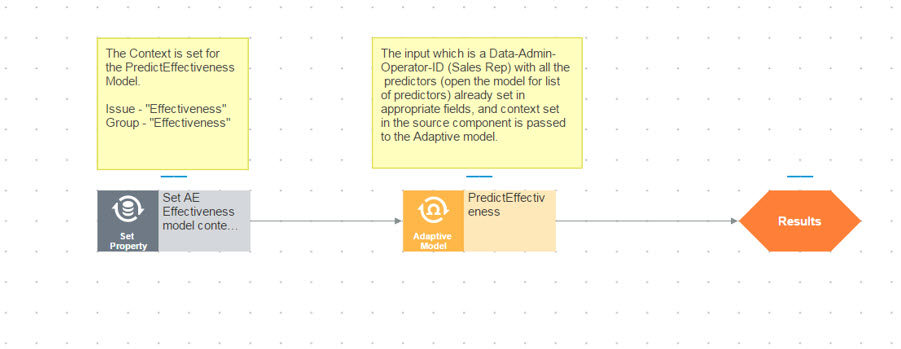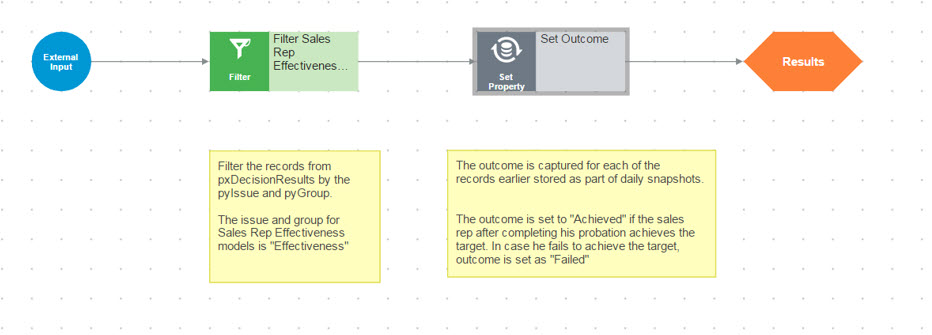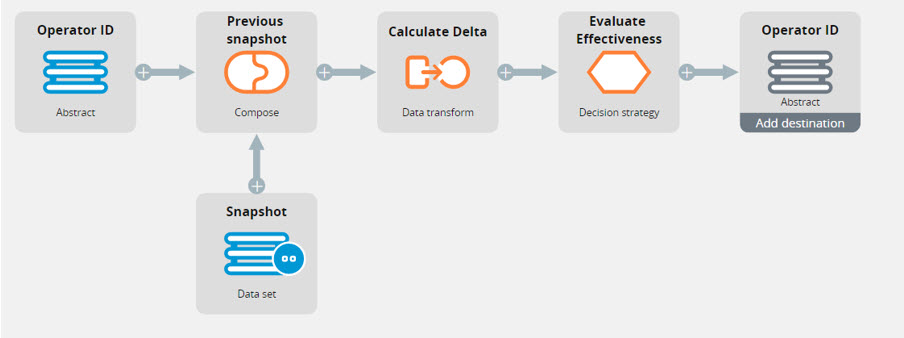Pega Sales Automation artificial intelligence-based sales coach
The Pega Sales Automation™ application uses built-in decisioning capabilities to provide managers with insights about how sales representatives perform during their 90-day probation period. During the first 90 days, the adaptive models analyze data about the sales representatives including their profession, experience, training performance, weekly pipeline data, and the pipeline delta.
The Pega Sales Automation application suggests actions to managers based on the performance of sales representatives. It also provides suggestions to sales representatives about how to improve their performance. The artificial intelligence model predicts the probability to reach the target, for example, reaching a target of $300,000 in 18 months. You can configure the definition of success ($300,000), T-Zero (3 months), and T-End (18 months).
Review the following sections:
- Coaching life cycle and coaching actions
- Historical data and adaptive learning
- Effectiveness widgets architecture
Coaching life cycle and coaching actions

Coaching recommendation life cycle
Sales manager coaching actions
When each week starts, sales managers receive notifications from the sales coach. Sales managers can then perform the following actions:
- Click the recommendation notification. The manager’s Pulse feed opens, displaying new coaching recommendations.
The Coaching plan widget displays in the panel on the right side of the Pulse feed. Coaching recommendations display on the tab in the Coaching plan widget.
- Filter the recommendations by the sales representative and identify the coaching recommendations to pursue.
- Click the button for each recommendation and create a coaching plan.
The Recommendation dialog box contains details about the Recommended Value and Current Value for the selected category for the sales representative. - Select the next touchpoint by choosing a Follow-up date.
- Click .
The recommendation status becomes Active and a notification is sent to the sales representative indicating that a coaching plan has been assigned.
Sales representative coaching actions
Sales representatives receive notifications from the sales coach indicating that a coaching plan has been assigned to them. Sales representatives can then perform the following actions:
- Click the notification to open the Coaching Plan dialog box.
- Communicate with the sales manager by using the Pulse feed available on the Coaching Plan dialog box.
- Provide progress updates by using the Pulse feed available on the Coaching Plan dialog box.
Only the sales manager and the sales representative can see these Pulse communications—they are not visible to anyone else in the organization.
Sales coach bot coaching actions
On the day that sales representatives follow up on their coaching plans, the sales coach bot posts a comment in the Pulse feed of the coaching recommendation explaining the sales representative's progress. The post contains details about the degree of improvement made by the sales representative. Sales managers can then decide whether to follow up with the sales representative, complete the plan, or cancel the plan.
Historical data and adaptive learning
Pega Sales Automation uses self-learning, adaptive models to generate the effectiveness scores for each sales representative. This method is based on core Decision Strategy Manager capabilities. If needed, you can add or remove predictors.
Historical data
The key predictors are configured in the adaptive model rule based on the analysis of data from real production environments. After the training period, the adaptive model activates or deactivates predictors. Production data is also used to create weekly snapshots for sales representatives during their first 18 months in the organization. The system uses data from the Human Resources systems to improve the accuracy of the predictors.
The Pega Sales Automation application has the following predictors in the adaptive model:
| Predictors | Human Resources predictors |
|---|---|
| Pipeline current (a number of the opportunities in a stage) | Number of days after joining |
| Delta between two snapshots (a difference between the current and the previous snapshot) | Experience in years |
| Territory | Educational qualification |
| Customer Interactions created | Business card title |
| Face-to-face (F2F) meetings | Job title |
| Other meetings | Source of hiring: referred, sourced, agency, direct, applied |
| Contacts added by sales representative | Sub-source for referrals: referred by, referral functional area |
| Inbound emails | Previous company details: company name, size, revenue |
| Outbound emails | Predictive indices, for example: A, B, C, D, PI, A minus B. |
| Number of leads | HR ratings: green, blue, yellow |
| Leads converted to opportunities | Other information, for example, number of days for onboarding, completed courses, grades. |
| Manager |
Adaptive learning
An agent runs daily and executes a data flow that calls a decision strategy. A decision strategy contains the effectiveness adaptive model for all of the sales representatives who have not completed their first 18 months of employment to capture the data that is required by the models. The decision strategy uses the standard Delayed Learning cache. When a sales representative reaches 18 months of employment, the application triggers a response strategy from a data flow to retrieve the data for relevant decisions and to train the applicable model.
Sales coach architecture
Pega Sales Automation uses predictors ranging between Sales Automation and Human Resources that are listed in the PredictEffectiveness model, for example, sales representative pipeline, delta of pipeline, predictive indices, previous company details, and human resource statistics. You can configure the outcomes in the adaptive model. After a sales representative completes the 18-month probation period and achieves the target you specified, the system sets the outcome to Achieved. If the sales representative fails to achieve the specified target, or the employment contract is terminated before the 18-month probation period ends, the system sends failed and terminated outcomes to the models.
Coaching actions are evaluated in the SalesManagerCoachingActions strategy, which calls the CoachingActionsPredictors sub-strategy. The SalesManagerCoachingActions strategy runs through each predictor with the representative's propensity and maximum propensity for predictor, then suggests actions based on that information.
Review the following sections:
Strategies
EvaluateEffectiveness strategy
The EvaluateEffectiveness strategy is used to train the PredictEffectiveness model and to predict the effectiveness score of each sales representative.
To train the model and predict the effectiveness score, complete the following steps:
- In the navigation panel of Dev Studio, click Decision > Strategy, and then search for and select the EvaluateEffectiveness strategy.
- Under Strategy properties, change the mode from Make decision and store data for later response capture to Make decision.
The strategy sets the context for the model and calls the adaptive model. The system presents the results individually or as a set on the primary page, which you can configure in the strategy properties in the data flow.

The EvaluateEffectiveness strategy overview
EndProbation strategy
When the 18-month of employment period (T-End) is completed, the EndProbation strategy is called from the SalesRepProbationCompleted data flow. The strategy retrieves the daily snapshots of the sales representative and sets the outcome based on whether the sales representative achieved their target. The system returns the results to the data flow, which sources them to the pxAdaptiveAnalytics data set. The adaptive models learn and advance by using this data.

The EndProbation strategy overview
Data flows
PredictEffectiveness
The PredictEffectiveness data flow compares the sales representative object (Data-Admin-Operator-ID) with the previous snapshot (8 weeks earlier) to calculate the delta. The system retrieves the earlier snapshot for calculating delta by using the PegaCRM-Data-SFA-SalesRepSnapshot data set. The PredictEffectiveness data flow calls the EvaluateEffectiveness strategy with the mode set as Make Decision and updates the results, including the propensity, in the operator record. The propensity shows the effectiveness score for the particular sales representative.

The PredictEffectiveness data flow
SalesRepDailySnapshots
Every 24 hours, an agent calls the SalesRepDailySnapshots data flow, which captures snapshots of the predictors for each sales representative who has not completed the 18-month of employment period. To train the model and to predict the effectiveness score, the EvaluateEffectiveness strategy mode is set to Make decision and store data for later response capture. The application also stores the effectiveness propensity for each of the sales representative every day. The system calculates the optimal for each day by taking the average of the effectiveness score of all of the successful sales representatives on that day.

The SalesRepDailySnapshots data flow
SalesRepProbationCompleted
After a sales representative completes the 18-month employment period (T-end), the system updates the outcome for all of the previously captured snapshots. The EndProbation strategy sets outcomes based on the total amount that the sales representatives achieved. To train the model and to predict the effectiveness score, the EndProbation strategy mode is set to Capture response for previous decision in the past period. The results from the strategy are sourced to pxAdaptiveAnalytics.

The SalesRepProbationCompleted data flow
Previous topic Pega Sales Automation artificial intelligence-based opportunity insights Next topic Pega Sales Automation artificial intelligence-based lead ranking
